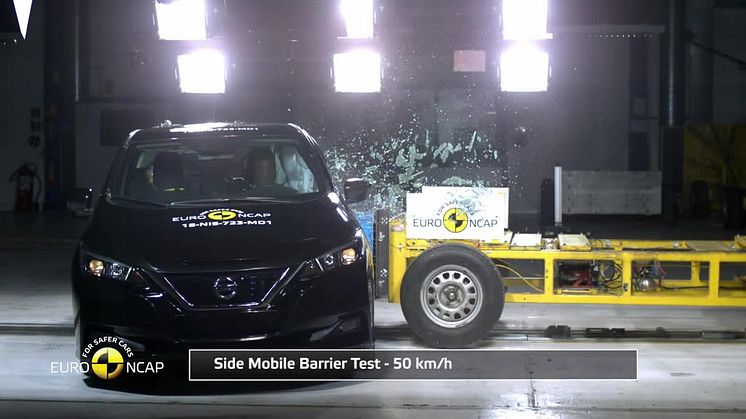Press release -
Electric Nissan LEAF generates five-star rating in Euro NCAP’s most exacting tests ever
- First car to go through new 2018 Euro NCAP regime scores five-star rating
- Innovative cyclist AEB test to protect Vulnerable Road Users introduced for 2018
- Thatcham Research calls for all fully electrified vehicles to have standard-fit cyclist and pedestrian AEB systems
Results for the first car to go through the Euro NCAP test programme this year have been released, with the zero-emission Nissan LEAF achieving a five-star Euro NCAP rating for safety.
Euro NCAP constantly raises the bar in its testing regime and 2018 has seen several new additions, which means achieving a five-star rating is tougher than ever. Key to the new programme is the introduction of tests to assess the performance of Autonomous Emergency Braking (AEB) systems which can detect cyclists.
Matthew Avery, director of research, Thatcham Research comments, “Safety campaigners have raised concerns about noise, or rather the lack of it, in fully electrified vehicles – especially in urban driving environments. This is why standard-fit AEB systems that can detect Vulnerable Road Users should be fundamental to any electric vehicle’s suite of safety technologies – as the Nissan LEAF demonstrates.”
Avery also highlighted the performance of the Nissan LEAF in impact testing, “Nissan has done a great job considering the additional challenges pure electric propulsion presents. Chief amongst those is the additional weight an electric battery brings, which must also be protected in the event of a crash.
“In none of the impact tests did we see any compromise of the battery. In fact, the Nissan LEAF achieved maximum points in the side pole crash test, showing good containment of the battery.”
New protocols for 2018
Euro NCAP introduced the assessment of AEB technology into the vehicle star rating scheme in 2014. The first application was for car-to-car front-to-rear collisions, with a recent study[1] showing a 38% effectiveness for the technology at reducing such collisions. In 2016 AEB sensitive to collisions with crossing pedestrians was introduced into the scheme.
2018 sees the biggest shake up to date, with Euro NCAP test protocols covering a greater proportion of ‘real-world’ crashes occurring on the road, including:
- Offset AEB scenarios where the car partially overlaps at the point of impact with the vehicle ahead were added to supplement the original full overlap car-to-car AEB test;
- A walking-in-road scenario and testing during darkness were added to existing crossing pedestrian scenarios;
- Scenarios for collisions with cyclists both crossing and riding along the road were also included.
Avery continues, “Unfortunately, accidents involving Vulnerable Road Users are on the increase. This has been reflected by the additional onus the latest Euro NCAP regime places upon carmakers to fit AEB systems that can identify pedestrians and cyclists. The cyclist AEB assessment is one of Euro NCAP’s most demanding tests – it happens quickly, and systems must be more sensitive to the erratic movement signature of a human being riding a bicycle.
“Without such AEB systems in place, carmakers will struggle to achieve a maximum five-star Euro NCAP rating.”
[1] 2015 study by Euro NCAP and Australasian NCAP
Topics
- Transport
Thatcham Research is the independent voice of automotive safety & repair, advising motorists, insurers and vehicle manufacturers to help reduce accident frequency, severity and costs and to realise the vision of ‘Safer cars, fewer crashes’.
As well as its world leading crash and track research, Thatcham Research tests and accredits crash repair parts, vehicle repair technicians, and a number of other products and services within the collision repair industry for insurers, motor manufacturers, equipment manufacturers and suppliers.
In addition, Thatcham Research has been at the forefront of vehicle security since the 1990s when it introduced the New Vehicle Security Assessment (NVSA) to address levels of vehicle crime.
A founder member of the international Research Council for Automobile Repairs (RCAR), Thatcham Research has also been a member of the European New Car Assessment Programme (Euro NCAP) since 2004.

